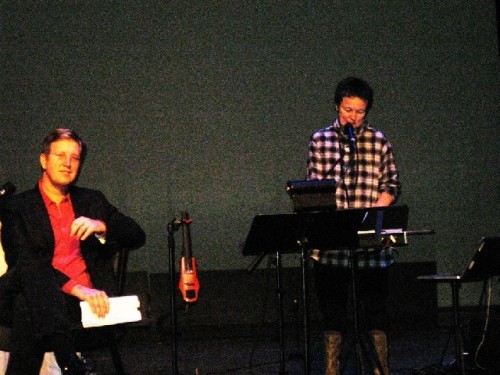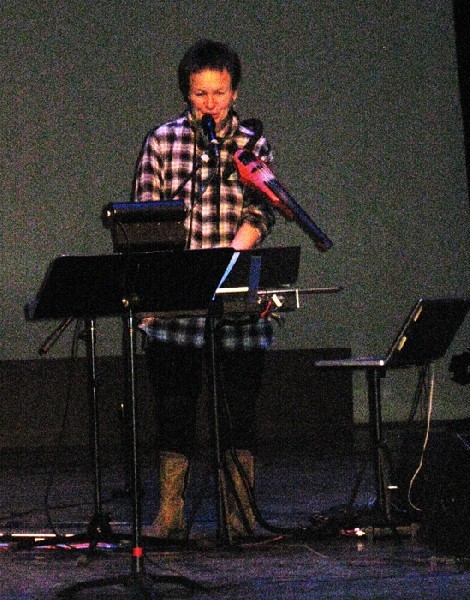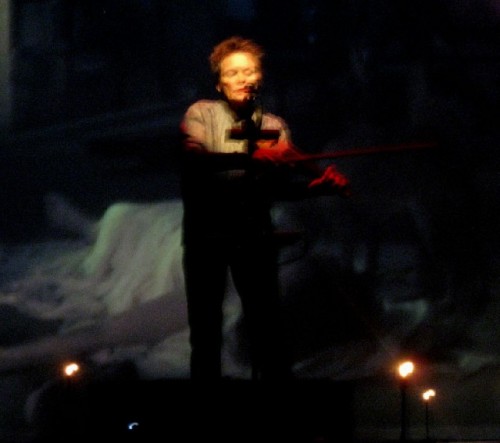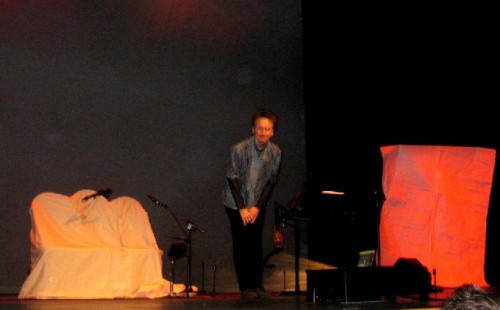Laurie Anderson's Delusion
'62 Center Williams College
By: Charles Giuliano - Feb 27, 2010
The multi media performance piece Delusion, combining music, the spoken word, and video projections was partly developed by Laurie Anderson while in residence at Mass MoCA. She discussed the work in progress with the museum's director, Joe Thompson, before a capacity audience. Last night she returned to the region's '62 Center at Williams College having recently premiered the piece during the Winter Olympics in Vancouver.
On a stormy evening, the first of two performances, there was a large but less than capacity audience. For many who attended the Mass MoCA lecture there was a sense of excitement and anticipation. Anderson is an icon of the BAM, New York, downtown, avant-garde scene. It is a perk of living in the shadow of Mass MoCA that such living legends regularly regale us with rural intelligence.
There is much that is plucky, feisty and gruff about her stage persona from the shock of spiky hair, casual, unisex attire, to a daunting command of multi media and all of its state of the art gadgetry. She was up there working it, all by herself, for some hour and twenty minutes. It was both a virtuoso display of her versatility and durability as well as a challenge for the endurance of the audience.
Depending on your age, life experience, and eagerness for new aesthetic experiences the evening was either scintillating or enervating. It is fair to say that there were generous portions of those extremes. For the most part the audience appeared to be respectful and attentive but tepid. Now and then there were episodes of laughter at absurdist surreal humor. It was a response more to irony than comedy. The piece, which combined the poetic, tragic (the resent loss of her mother), and knee jerky preachy mostly slid by as a whispered, throaty, lower register, super articulated, mesmerizing drone. At times it verged on the soporific.
It was an experience of contemporary art more to be experienced than enjoyed. Overall, we were thrilled to have the opportunity to view cutting edge work. There are bragging rights about attending and reporting on the latest efforts of a renowned artist. It also evoked trepidation about missing the point of what may be regarded as a canonical piece. There was the aura of earning a merit badge as an ersatz Eagle Scout of the avant-garde.
Remarkably, Anderson functions on so many levels. Delusion is a gesamtkunstwerk and signifier of the multi-valent genius of the artist. For an assignment editor there is the conundrum of just who to send? Is this a task for the theatre, music, art or literature critic? By default we are filing this as a theatre review. Surely a specialist in each of these disciplines would see the evening differently. Perhaps it is beyond the grasp of a single assessment. There is a risky alternative approach of conveying the humanistic aspect of an individual responding to multiple assaults on the senses. Should one separate and evaluate all the simultaneous elements or report on the totality of the experience?
Taking a separatist approach the most fresh and compelling aspect of the work is the inventive collage of visual projections. When other elements stumbled and faltered there was always something interesting to look at. Much of this involved low tech videos cavorting in nature. There was a sequence of animations of primitivist drawings of houses, people and pets with graffiti on a black board. This element had an expressionist appeal as did the panning shots of weeds and underbrush, vegetable gardens, lunar landscapes, sheets of rain, flame and fast flickering falling leaves.
There was an interior sequence involving a shot from behind of her looking into a room and encountering a mature male with camera. It evoked an incident of the artist as a spectator on a scene from her life.
Anderson's primary reputation comes from composing original music and performing electronic violin passages. For this she was accorded a recording contract with a major label. The aural aspect conveys the inventive, sound as music approach of John Cage, combined with a new age touch hovering far too close to Yanni at the Acropolis.
Her violin was used to evoke the sentimental or maudlin when the text conveyed notions of loss and death. This included a botched attempt to visit an unloved, dying mother. To grudgingly bring flowers and give thanks for the gift of birth. But it devolved into a bathetic, chaotic image evoking a madcap scene from Grey's Anatomy.
The music started with the clip of Mongolian Throat Singing which she had discussed with Thompson. She employed all those foot pedals hooked up to computers churning out a pre recorded, studio sound track. She augmented the canned music with live electronic violin passages that were pedestrian at best.
The simple staging at the '62 Center established four video projections. There were hanging sheets of paper, a rock form, and a large screen at the back of the stage. There were also three performing positions. From one she played violin, manipulated computers, and read from a notebook. Occasionally she moved to another position with a mike stand. It was here that we had our clearest view of her. In the center of the stage was a boulder which also served as a seat or couch. Here she primarily went into a poetic mode reading with a droning accompaniment. Often this entailed her more portentous pronouncements.
The text conveyed throughout the piece was indeed Delusional. It provided a Swiftian/ Orwellian overview of vignettes with a loose connection. It conveyed epic messages about Big Brother and man's willful corruption of the environment. To make this point we were taken on a space shuttle to the moon. There to speculate on its exploitation by various nations. The moon was considered as an eventual dumping ground for our nuclear waste. She speculated that it will be claimed by China. Setting up disputes with the US and Russia. Even Italy will claim that it "saw it first." What she likes about the stars, accompanied by "Twinkle Twinkle Little Star" in a child like voice, was that they are too remote for human exploitation and contamination.
The Big Brother persona often mused in an amusing manner. It considered the naming of Great Britain. It was so designed to impress the importance of the island nation on its far flung colonies. Why not then "Super Huge United States" or "Really Enormous Russia?" There was an over the top sequence of having her dog surgically inserted into her womb so she might give birth to the pooch. There were comic innuendos of this absurdist scenario which delighted and amused the audience. File this under cheap thrills.
The spoken elements were more poetic than poetry. Through computer manipulation she was able to switch to a deep male voice. This was an ironic Big Brother persona which delivered the heavy duty, insightful stuff. Here the medium was the message, interlaced with surreal humor which entailed jokes and a few laughs. It was difficult to sort out if we were laughing at or with her.
When it ended, there was polite applause. She bounded back for a quick bow and exited hastily. The audience was hardly hungry for more. We had our fill; of just what is a puzzle. Yes it was a total work of performance art; a remarkable accomplishment for a single artist. But just what was Delusion? There is no compelling insight to share. While brilliant, defiant, and edgy the whole, alas, was less than the sum of its arts. It all seemed so, well, delusional.
Vancouver's Georgia Straight review.





